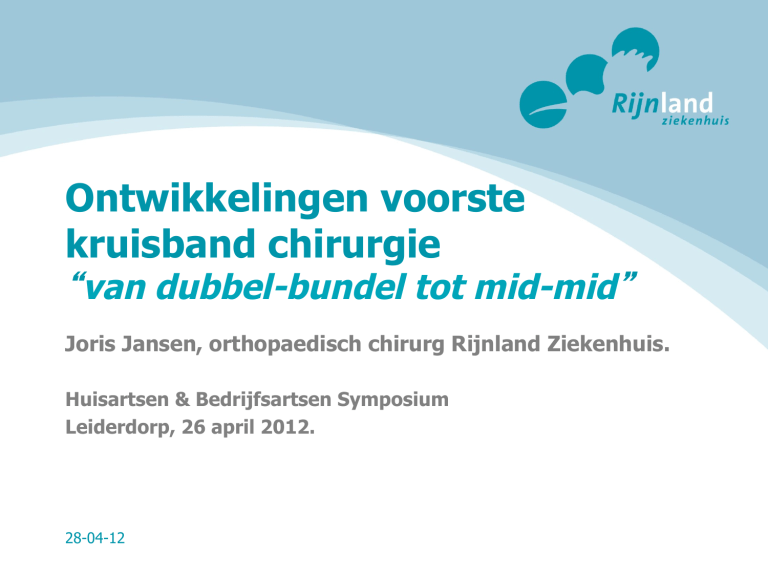
Ontwikkelingen voorste
kruisband chirurgie
“van dubbel-bundel tot mid-mid”
Joris Jansen, orthopaedisch chirurg Rijnland Ziekenhuis.
Huisartsen & Bedrijfsartsen Symposium
Leiderdorp, 26 april 2012.
28-04-12
Ontwikkelingen VKB chirurgie
“van dubbel bundel tot mid-mid”
• Dubbel-Bundel?
of
Mid-Mid?
Ontwikkelingen VKB chirurgie
“van dubbel bundel tot mid-mid”
• Inleiding
• Historie
• Anatomie VKB
• Graft & fixatie
• Begeleidend letsel
• Complicaties
• Revalidatie
• Conclusie
Inleiding VKB ruptuur
• VS:
• 1/3000 mensen VKB ruptuur
• M : V = 1 : 5
• >50% reconstructie
• NL:
• á sporters in alle leeftijdscatergorieën
• á letsels & á wens knie stabiliteit
• met name voetbal & ski trauma
• >6000 operaties/jaar
Historie VKB
• 1845 Amédée Bonnet:
• “knak” met haemarthros & functie â
• 1879 Paul Segond:
• beschreef avulsie laterale tibia plateau
• 1895 Mayo Robson:
• 1e VKB gehecht bij 41 jarige mijnwerker
Historie: extra-articulaire VKB
• 1903 Frederich Lange:
• semitendinosis pees transplantaat
• 1917 Hey Groves:
• ileotibiale band reconstructie
• 1935 Willis Campbell:
• patella pees graft
Historie: VKB testen
• 1972 MacIntosh:
• Pivot shift test
• 1976 John Lachman:
• Lachman test
Pathofysiologie VKB ruptuur
• Trauma mechanisme
• Non-contact
• Deceleratie
• Valgus stress
• Pivoterend moment
• Hyperextensie
Diagnose VKB ruptuur
• Lichamelijk onderzoek
• Voorste Schuiflade test
• Lachman test
• Pivot Shift test
Diagnose VKB ruptuur
• Aanvullende diagnostiek
• MRI
Anatomie VKB
• Antero-mediale bundel
• Belang bij flexie
• Geeft antero-posterieure stabiliteit
• Postero-laterale bundel
• Belang in extensie
• Geeft rotatie stabiliteit
Van dubbel-bundel naar mid-mid
• Dubbel-bundel techniek
• Theoretisch betere biomechanica
• Maar ook “double trouble”
• Freddie Fu, What’s new on ACL surgery horizon?, Curr Rev Med 2011.
Van dubbel-bundel naar mid-mid
Anatomische reconstructie
• Via antero-mediale portal:
• positionering in mid-femorale &
• in mid-tibiale aanhechting
Brown & Spalding, Validation of mid-femoral tunnel position technique
in ACL reconstruction using 3-D CT, Arthroscopy 2011.
Graft keuze VKB reconstructie
• Hamstrings (gracilis & semitendinosis)
• Bone-patella-bone
• Quadricepspees
• Allografts
• Synthestisch grafts
Fixatie opties VKB reconstructie
• Endobutton
• Transfix
• Interference schroef
Begeleidend letsel bij VKB
• Meniscus scheur mediaal of lateraal
• (Osteo)chondraal lesies
• Mediaal collateraal ligament
• Lateraal collateraal ligament
• Posterolaterale hoek
• Achterste kruisband scheur
Complicaties
• Infectie
• Haemarthros
• Paraesthesie
• Pijn patellofemoraal / osteochondraal
• DVT/PE
• Arthrofibrose
• Re-ruptuur
Nabehandeling
• 2 weken fraxiparine
• 2-3 weken krukken
• Opbouwend belast van 50 naar 100%
• Fysiotherapie via Rijnland VKB netwerk
• Beweging: flexie-extensie
• Kracht: quadriceps
• Coördinatie: propriocepsis
• >9-12 mnd sport participatie oude nivo
Revalidatie aanbevelingen NOV
www.orthopeden.org Richtlijn VKB 2011
• Combineer kracht & neuromusculaire
oefentherapie
• Vroege revalidatie: gesloten keten
training
• Geen indicatie voor braces post-op
• Geen hervatting van zwaar fysieke werk
of sport <3 mnd post-op (rennen, kap/
draai sport, knie belastend werk &
risicovolle pivoterende activiteiten)
Conclusie
• VKB ruptuur veel voorkomend trauma
• Toenemend aantal VKB operaties
• Trend naar anatomische reconstructie
• Belang van goede revalidatie
• Meting outcome Rijnland VKB netwerk
The outcome at 15 years of endoscopic ACL reconstruction using
hamstring tendon autograft for 'isolated' ACL rupture.
L Pinczewski, JBJS 2012.
•
The purpose of this study was to report the outcome of 'isolated'
anterior cruciate ligament (ACL) ruptures treated with anatomical
endoscopic reconstruction using hamstring tendon autograft at a
mean of 15 years.
•
100 men & 100 women with 'isolated' ACL rupture underwent 4-strand hamstring tendon
reconstruction with anteromedial portal femoral tunnel drilling and interference screw
fixation by a single surgeon. Details were recorded pre-operatively and 1, 2, 7 & 15 years
post-op. Outcomes included clinical examination, subjective & objective scoring and
radiological assessment.
At 15 years only 8 of 118 patients (7%) had moderate or severe osteo-arthritic changes
(International Knee Documentation Committee Grades C and D), and 79 of 152 patients
(52%) still performed very strenuous activities. Overall graft survival at 15 years was 83%
(1.1% failure per year). Patients aged < 18 years at the time of surgery and patients with >
2 mm of laxity at one year had a threefold increase in the risk of suffering a rupture of the
graft (p = 0.002). There was no increase in laxity of the graft over time.
•
•
ACL reconstructive surgery in patients with an 'isolated' rupture using
this technique shows good results 15 years post-operatively with
respect to ligamentous stability, objective and subjective outcomes,
and does not appear to cause osteoarthritis.
Clinical results and risk factors for reinjury 15 years after anterior
cruciate ligament reconstruction: a prospective study of
hamstring and patellar tendon grafts
• L Pinczewski, Am J Sports Med 2012
• Anterior cruciate ligament reconstruction using
ipsilateral autograft continues to show excellent
results in terms of patient satisfaction, symptoms,
function, activity level, and stability. The use of HT
autograft does, however, show better outcomes than
the PT autograft in all of these outcome measures.
Additionally, at 15 years, the HT graft-reconstructed
ACLs have shown a lower rate of radiological
osteoarthritis.
